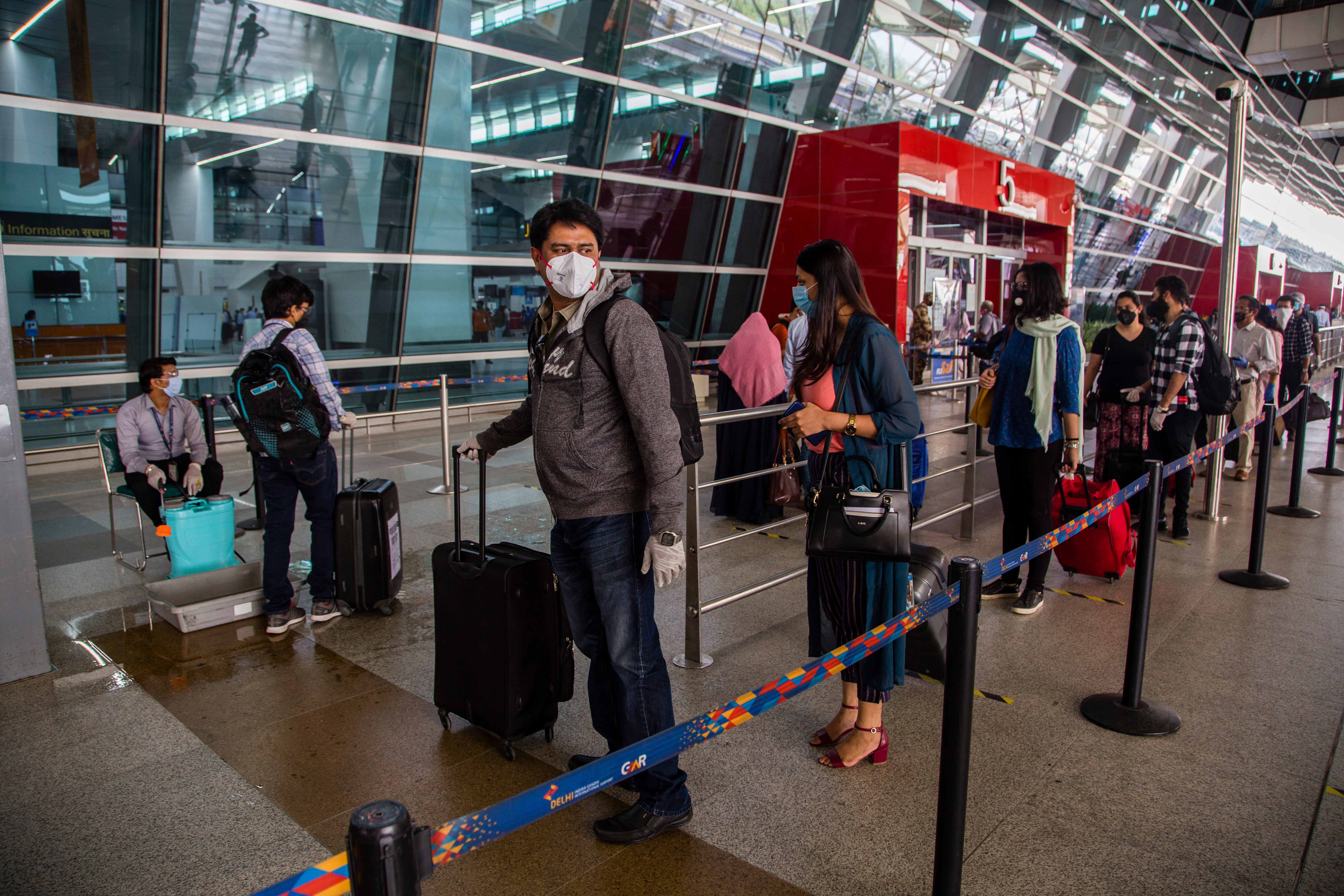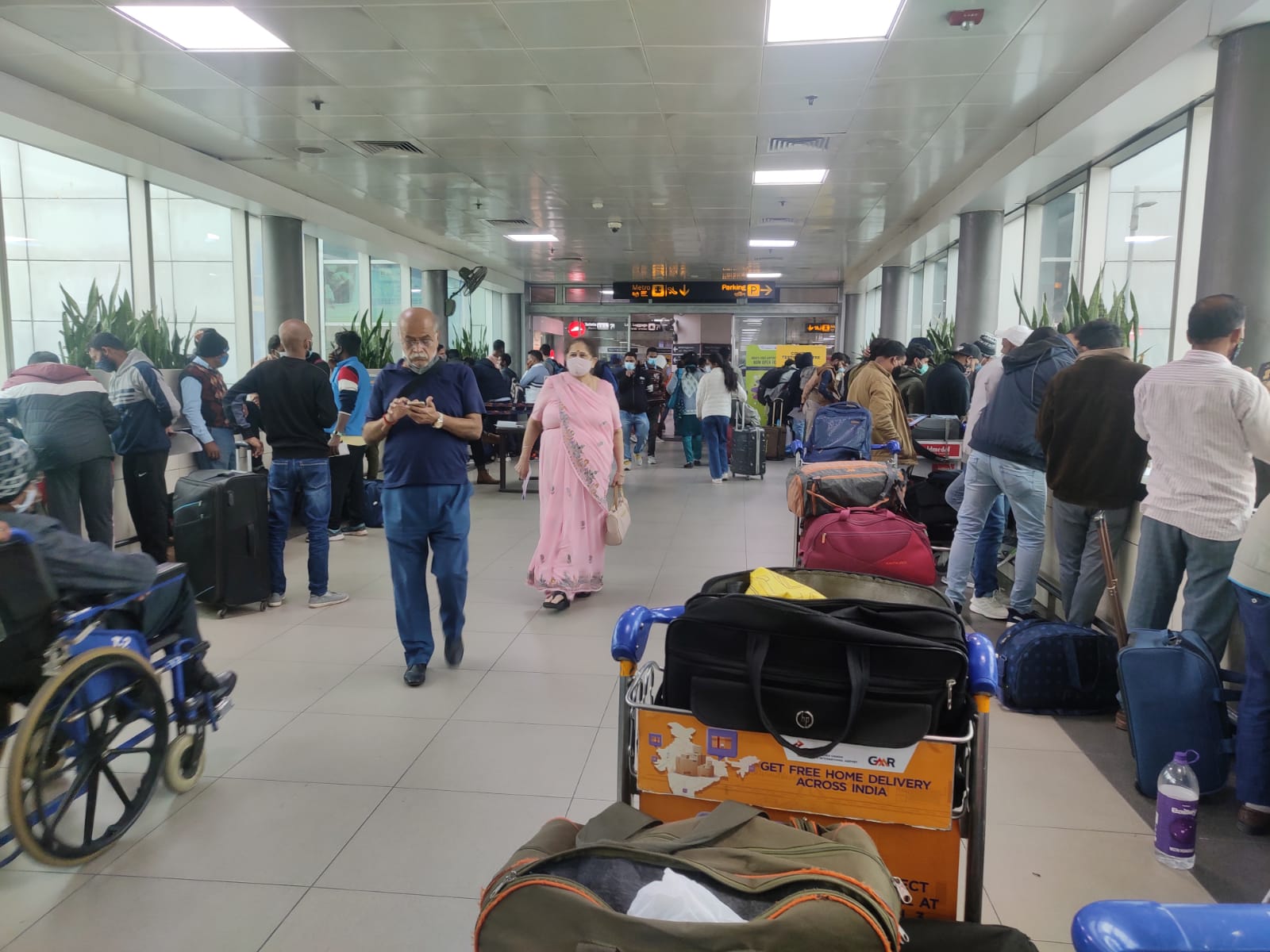Omicron rules: Chaotic scenes at Indian airports as travellers face last-minute changes to testing protocols
Under new measures in response to omicron variant, international passengers cannot leave Delhi airport until they receive RT-PCR test results

Your support helps us to tell the story
From reproductive rights to climate change to Big Tech, The Independent is on the ground when the story is developing. Whether it's investigating the financials of Elon Musk's pro-Trump PAC or producing our latest documentary, 'The A Word', which shines a light on the American women fighting for reproductive rights, we know how important it is to parse out the facts from the messaging.
At such a critical moment in US history, we need reporters on the ground. Your donation allows us to keep sending journalists to speak to both sides of the story.
The Independent is trusted by Americans across the entire political spectrum. And unlike many other quality news outlets, we choose not to lock Americans out of our reporting and analysis with paywalls. We believe quality journalism should be available to everyone, paid for by those who can afford it.
Your support makes all the difference.International passengers arriving at Delhi’s main airport on Thursday were met with long waits and some chaotic scenes, a day after new coronavirus screening guidelines designed to catch the omicron variant came into effect.
Under the regulations issued following the discovery of the new and potentially highly transmissible variant, travellers coming from 14 “at-risk” countries including the UK, South Africa, China, Israel and Singapore will have to undergo compulsory RT-PCR testing before they can leave the airport.
If an international passenger tests positive they will be kept in strict institutional isolation and their samples will be sent for genome sequencing. Those who test negative will still be required to undergo seven days of home quarantine, and be tested again on the eighth day.
With the strict new protocols in place, the country announced its first two cases of the omicron variant on Thursday afternoon — two foreign nationals whose samples were taken on Wednesday in the southern state of Karnataka.
India has only just reopened to international tourists and the threat of omicron is a real blow to an industry ravaged by the pandemic. Officials at Delhi’s Indira Gandhi International (IGI) Airport tried to offer reassurances that “international arrivals are running smooth” in spite of the new rules — but multiple passengers told The Independent they were being held up by waits for testing lasting many hours.
Those arriving at IGI are being offered two testing options — a fast-track which offers results in 90 minutes for Rs 3500 (£35) or a regular RT-PCR test that costs Rs 500 (£5) and returns a result in six hours. Under the new guidelines, health officials at the airport are also randomly testing about five per cent of the passengers arriving from other countries using the same facilities.
Manish Sharma, 31, a resident of London travelling to India to meet his family, told The Independent, that he paid more for the rapid option, yet “from test to getting the results, it took me about two and a half hours”. And while there are arrangements for the passengers to sit and wait, little regard is being given to social distancing.
Passengers coming from the listed countries are not allowed to pass through passport control without showing their negative results — a process that is having a knock-on effect of slowing down the immigration desk as well.
Mr Sharma said he wished he had booked his ticket for a day earlier. “That would have saved nearly ten hours that I have spent at the Delhi airport,” he added.
Punjab Singh, 34, said it took him at least five hours to get out of the airport after arriving from Portugal, including “three to four hours” waiting for Covid test results.
“The arrangements inside were not good. Not good at all. There was a long wait. The passengers are forced to undergo a lot of trouble. They require more people to do the test,” he said.
Not all passengers had issues, and in particular those coming from countries not listed as “at risk” for omicron said the experience was largely “hassle free”. Yoshita Singh, 39, travelling to India from New York, said the immigration checks were “pretty convenient”. “The processing was fast and smooth. There were just 10-15 passengers before me. But I did see that a lot of people coming from UK flights were inside and were waiting for their [RT-PCR tests].”
Some India states, including Maharashtra and its travel hub capital Mumbai, have responded to the threat of omicron by requiring negative test results for domestic passengers as well, in new rules also introduced in the last couple of days.
As a result, there has been a spike in demand for Covid testing at the airport before departures. A niche service that was previously offered just outside the main departures entrance, the process has been moved across the room to part of the parking and Metro complex to accommodate the rush.
The normally quiet corridors inside were packed with luggage trolleys and passengers queuing, filling forms or waiting for test results while others, tired of the long waits, had dozed off.

Among those was Amit Kumar Sharma, 34. A resident of the eastern state of Bihar, Mr Sharma had an early flight to Kuwait. Fearful that he might miss the flight amid the new norms, he arrived at the airport a full day early. Having submitted his sample at around 10am, Mr Sharma said he had still not received a result some five hours later. “I have been told we will receive the report in about six hours,” he said. Despite the complex offering little protection from Delhi’s toxic winter air pollution, Mr Sharma said that he had no choice — that was where he would be staying the night.
Join our commenting forum
Join thought-provoking conversations, follow other Independent readers and see their replies
Comments